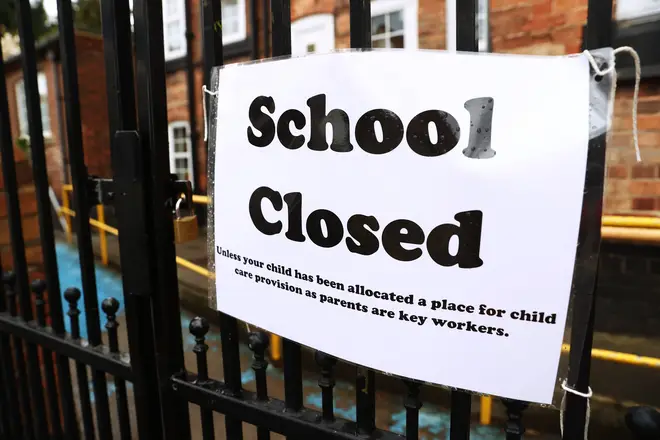
Clive Bull 1am - 4am
15 May 2020, 06:24

The Government is coming under pressure over the partial easing of the coronavirus lockdown in England with Labour and council leaders looking to push back on Minister's plans.
Unions and council leaders have accused the Government of moving too fast in plans to reopen schools, and want more control over classes restarting.
The Opposition has also taken aim at Boris Johnson track-and-trace plans suggesting the team should be much larger than currently planned.
Contact tracing is believed to be a key part of lifting lockdown measures and slowing the infection rate.
The Education Secretary has used an article in the Daily Mail to urge teaching unions to do their "duty" and drop objections to children going back to school next month.
Writing in the newspaper, Gavin Williamson said safety must come first, but a phased return is needed to avoid damage.
The Local Government Association (LGA) is suggesting schools be allowed to make their own decisions about when schools reopen as the coronavirus lockdown eases, especially in areas where there is a higher proportion of black, Asian and minority ethnic residents.
Read more: Can I get the new coronavirus antibody test? How does it work?
Listen & subscribe: Global Player | Apple Podcasts | Google Podcasts | Spotify
Councillor Judith Blake, chairwoman of the LGA's children and young people board, said parents were "anxious" about sending their children back to school and said more needed to be done to reassure families.
Prime Minister Boris Johnson, when announcing his plans for taking England out of lockdown, said Reception, Y1 and Y6 pupils could go back as soon as next month.
Read more: First coronavirus antibody test approved in UK is '100% accurate'
And Education Secretary Gavin Williamson this week said medical and scientific advice was "saying it's the right time to start bringing schools back in a phased and controlled manner".
But the LGA is calling for some schools, in consultation with councils, to be given greater flexibility locally over reopening as they argue that some communities are at higher risk.
Read more: Teachers' unions call on Government to 'step back' on reopening schools

Mother's concerns over her children returning to school following lockdown
It comes after an analysis by the Office for National Statistics (ONS) suggested that black men and women are more than four times more likely to die a coronavirus-related death than white people.
Mary Bousted, joint general secretary of the National Education Union, said a "wider opening of schools, too early, poses a lot of unanswered questions about the risks in poor communities".
Read more: House prices could take a year to recover from coronavirus
On track-and-tracing, Rachel Reeves, Labour's shadow chancellor of the Duchy of Lancaster, has challenged the Government on whether its manual contact tracing operation - designed to warn people if they have come into close proximity with an infected person - will be well resourced enough to carry out the task successfully.
In a letter to her opposite number Michael Gove, she questioned why, according to reports, outsourcing giant Serco had been asked to provide 18,000 staff "despite some public health professionals suggesting as many as that 50,000 staff are needed" on top of the roll-out of the NHS Covid-19 symptoms app.
She said the set-up of the team would have "consequences which are profound both in terms of public health and the economy".
Read more: Universities 'may be at risk' due to reliance on Chinese students

Boris Johnson calls for worldwide unity in Covid-19 fight
The UK's rate of infection appeared to be slowing, with academics at the University of Cambridge reporting that the R rate was now firmly under 1.0 - a goal the Prime Minister has set in order to keep gradually releasing the lockdown in the coming months.
London, according to the university's MRC Biostatistics Unit, has an R rate (a measurement of the number of people an infected person passes the disease to) of 0.4, the lowest in the country, having once been the worst affected in terms of coronavirus-related hospital admissions.
It means for every 10 people who are infected, they are likely to pass it onto four people, with 24 daily transmissions said to be occurring currently in the capital.
According to the modelling, which is the the work of a joint Public Health England (PHE) and University of Cambridge group, the English region with the highest R rate is the North East and Yorkshire, with a transmission rate of 0.8.

Coronavirus: Should children go back to school? Virologist explains to LBC
Further updates are expected in the coming days on how the forthcoming antibody test will work.
As we reported yesterday, PHE has approved a new test from the pharmaceutical giant Roche after experts at its Porton Down facility gave it the green light.
The test - which the PM has previously called a "game-changer" - picks up cases where somebody has had coronavirus in the past, and can be used on people who experienced no symptoms.
Professor Van-Tam said it was clear that people who had Covid-19 generated an antibody response, but it would "take time" to understand whether in all cases people developed immunity against coronavirus.
Number 10 said the new antibody test would "certainly" be available on the NHS, but commercial discussions with Roche are ongoing.
Roche said it could supply hundreds of thousands of the tests each week.
The pharmaceutical firm said it would prioritise tests for distribution via the NHS before looking at how they may be sold to individuals.
The Prime Minister's official spokesman said the idea of an "immunity certificate" was also still under consideration if science showed that people developed immunity to Covid-19.